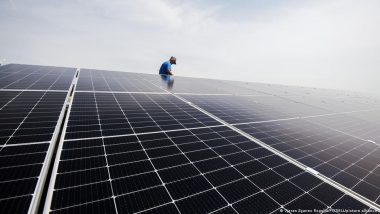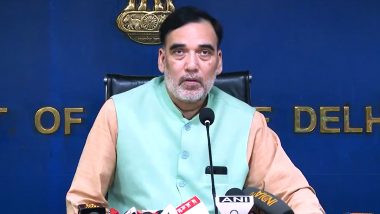Why is there so little solar energy in one of Europe's sunniest countries? Meet the Croatians battling old socialist stereotypes and red tape to bring the power of the sun to the small Balkan country.Visitors to the Croatian isle of Cres, with its vivid blue Adriatic waters, rolling lush farmland, and quaint villages, will regularly be reminded by locals to relax, because, as the island motto goes, there's "no stress on Cres."
Also Read | Sports News | Harry Kane, Sane Score to Help Bayern Munich Beat Man United in UCL Group Opener.
Apart from a lack of stress, there's another thing largely absent from Cres — and that's solar energy, even though the island lies off Croatia's sun-kissed coast.
Also Read | India News | Implement Women’s Reservation Bill Without Delay: Bihar CM Nitish Kumar.
But a group of islanders is now trying to harness the power of the 3,000 hours of sun they enjoy yearly and help the community decarbonize by 2040 with a citizen-owned solar power plant. The planned project is fully crowdfunded.
"We've done a homemade YouTube video basically of two or three minutes," said Franjo Toic, manager of the Apsyrtides energy cooperative, which was set up in 2021 and is behind the 500-kilowatt solar plant. "We showed what is going to be, what we are focused on, who we are."
Toic, who was born on Cres and works for the local municipality, said the response was enormous. Within just three weeks of opening the campaign, Apsyrtides had raised €100,000. Their goal had been €60,000.
"We were quite surprised about the local community movement, and they were quite eager," added Toic, who like many on the island, also rears sheep.
Cres and its inhabitants are well ahead of the solar energy curve in Croatia. Around 1% of electricity came from solar in 2022, although its coast is one of the sunniest places in Europe.
Croatia lags on solar energy, but trend is shifting
At first glance, the small Balkan country looks like a renewables haven. Some 65% of its electricity comes from green sources, mainly from old Yugoslav-era hydropower plants and a little wind and biomass.
Still, it's heavily dependent on climate-wrecking fossil fuels, which accounted for around 36% of the country's electricity needs in 2022. And as climate change-related drought increases, hydropower can't keep up with demand. Imported coal, oil and gas are filling the gap.
"In Croatia, we have exhausted all of our hydropower resources," said Andro Bacan, a renewable energy expert at the state-owned Energy Institute Hrvoje Pozar back in the busy capital Zagreb.
Expanding solar power seems like a no-brainer if the country is to cut its CO2 emissions 45% by 2030 but lagging regulation, grid connection issues and slow bureaucracy are hampering the technology, said Bacan.
Still, there is some progress, he said. The last five years have seen an increase in the amount of installed solar capacity, even if it remains small at 220 megawatts. Bacan believes that trend will continue.
A mix of factors, including a drop in solar prices, newly introduced tax relief for installing rooftop panels, and a desire for energy security resulting from Russia's war in Ukraine are driving new interest in the green energy source, said Mislav Kirac, program coordinator at Green Energy Cooperative or ZEZ.
"We are seeing a momentum," Kirac said. "Local authorities are starting to understand that their source of energy or their energy resilience or crisis resilience is important … and it's getting more into the mainstream than it was five years ago."
Red tape and mistrust hampering energy cooperatives
Energy analyst Bacan says cooperatives like ZEZ are playing a "crucial role" in expanding solar with their projects and by raising awareness.
ZEZ was initially set up in 2013 as part of a United Nations project to develop energy co-ops in the country. They were "pioneers in this particular niche," said Kirac, speaking from the organization's office in a nondescript building in one of Zagreb's leafy neighborhoods.
"There were literally none then," added Kirac.
ZEZ's goal is to democratize energy with citizen-owned, decentralized and affordable renewables. They envisage neighborhoods coming together to form their own energy communities that would transform not just electricity but also things like heat and mobility.
However, Kirac and other green energy advocates say the regulations governing energy communities are frustratingly complicated and overly bureaucratic.
Cooperatives are also at times a tough sell in a former socialist country where some associate them with past corruption and abuse. But ZEZ has had success with the model in places like Cres and neighboring island Krk, as well as the city of Krizevci, which has become a green leader in the Central Eastern European country.
No stress on Cres
Selling the idea of a cooperative wasn't difficult on Cres, despite negative associations from the past, said Apsyrtides cooperative manager Franjo Toic, speaking from his office in the island's main town. The walls are adorned with photos of old stone huts once used by farmers for shelter when out harvesting in the vineyards or looking after their sheep.
"If we were on the mainland in a big city of 100,000 people, it would be definitely harder to reach out to those stakeholders and to gain trust to invest in this project," he said.
His main complaint about solar energy in Croatia comes down to red tape. The Apsyrtides co-op has been waiting for over a year and a half to get the green light to start installation on the solar plant. He hopes everything will be up and running within a year so its backers can get a return on their investment.
And while everyone on the island knowing each other might have been beneficial in setting up the energy cooperative, there is one downside too.
"It's a funny thing when you live in a small community your reputation is quite at stake," said Toic. If the project flops, he joked, he may have to flee the island.
"I'm trying not to break anything, me and my colleagues because we love this island. We think we are doing great stuff. I don't want to run away from Croatia," he said.
But before he gets too anxious, he reminds himself of the island motto.
"I got the gray hair, but at the end of the day, there is no stress on Cres."
Edited by: Tamsin Walker
(The above story first appeared on LatestLY on Sep 21, 2023 01:30 PM IST. For more news and updates on politics, world, sports, entertainment and lifestyle, log on to our website latestly.com).













 Quickly
Quickly


















